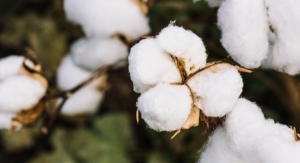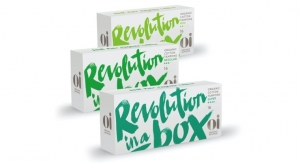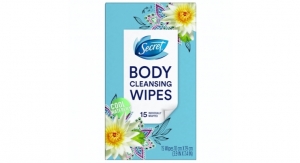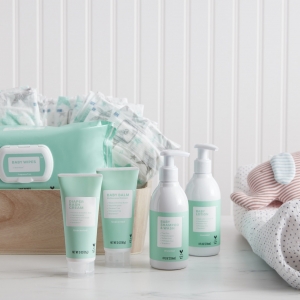“Consumer demands are making an unprecedented impact on policy trends for the baby and femcare markets in North America, which is affecting how the industry is making and marketing products,” says Jane Wishneff, executive director at the Center for Baby and Adult Hygiene (BAHP). “With this increased call for transparency, as well as “natural” and “organic” products, it is more important than ever that messaging regarding these products, whether it be to consumers or to policymakers at the state and federal levels, is based on sound science.”
Cora co-founder Molly Hayward entered the feminine hygiene market after traveling extensively as a women’s health market. As she developed Cora, as a brand and a company that addresses both the need for natural products in developed markets and products in general in developing regions, Hayward opted for ethically sourced ingredients like organic cotton.
“This category is shifting to natural and organic faster than anyone anticipated. We are glad that some of the incumbents are wising up and offering version of their products that are supposedly better
The company’s most recent effort is a light bladder leakage pad that brings it into the light incontinence space, an issue that is not just impacting older women like many larger brands would have you believe, says Hayward.
“We started with a hybrid absorbent pad that was optimized to absorb both blood and urine,” she adds. “This was a way to beta test our thesis that light incontinence is not solely experienced by women that are older than 55.”
The pad’s topsheet is made from 100% organic cotton that has been minimally processed.“From our perspective, education is one of the key factors in the shift that is happening in the market to naturals and women more and more are seeking out content that helps them understand their bodies better,” says Hayward, whose online blog Blood + Milk highlights women health issues like incontinence and menstruations. “For us it was logical to help expose them to this content and be the thought leader and the innovation in the thought space as well as the product area.”
Like, Cora similar natural-based fem hy products are changing the look of the hygiene aisles.
Organic Inititative, a New Zealand-based maker of certified organic hygiene products since 2015, enered the U.S. market this spring and soonafter launched new Oi Girl products, which offer younger girls a natural alternative in period care.
“Our initiative is to remove synthetics and chemicals from hygiene products and make healthy, premium certified and affordable products accessible for all women,” says Helen Robinson, CEO of Oi. “Using products like Oi is a small change that we can all make while we join the journey to a lifetime of safe and healthy products for ourselves and the environment.”
As the Oi products continue to gain traction in stores in the U.S. and globally, Robinson says she believes the use of natural products responds to a need not only for women’s health but for the health of the planet.
“There are a whole number of factors on why naturals is growing now,” she says.. “There is a growing awareness of the damage we are going to the world with manmade products.”
National Brands Take Notice
As start-up brands work to redefine the feminine hygiene markets, national brands are recognizing the importants of providing alternative products, featuring natural or organic materials, to their female customers. A year after launcing a natural baby care line under the Pamper Pure line, hygiene giant Procter & Gamble proved its commitment to natural products exptends to the fem hy category through the acquisition of This is L, an international brand that includes tampons, pads, liners and wipes made with organic cotton, earlier this year.
“This acquisition is a perfect compelment to our Always and Tampax portfolio with its commitment to a shared mission to advocate for girls’ confidence and serve more women,” says Jennifer Davis, president, P&G global feminine care.
L. has experienced strong growth and was available in more than 5000 U.S. stores prior to the acquisitions. It also has a donation program which has provided girls and women in need to more than 250 million products.
Following this acquisition, last month P&G expanded its footprint in naturals through the launch of Tampax Pure, a new organic tampon option, and Always Pure pads – both free of dyes, fragrances, and chlorine bleaching that require no compromise on ingredients or protection. Tampax Pure tampons have a 100% organic cotton core and deliver the protection expected from Tampax every time. New Always PURE pads are made with a cotton top layer from sustainably sourced cotton.
“I have always been a Tampax user, and period protection is the focus of my Research & Development career. I’ve tried lots of tampons, researched them, talked about them, designed them – I’ve done it all. In speaking with thousands of tampon users in the last several years, it was clear that there was still a big unmet need in the natural menstrual category – an option that worked well,” says Amy Krajewski, section head Global Tampax Research & Development. “Many people using current options are settling, and don’t even realize it because they go on autopilot with so many other decisions to make every day. When we set out to create Tampax Pure, we took our time to develop a tampon that is not only made with a 100% organic cotton core, but that also provides Tampax protection. Users can feel good about the ingredients, and trust that our product works.”
Like Tampax and Always, national brand o.b. is offering its customers a natural alternative with the launch of o.b. organic, a 100% certified organic cotton tampon from tip to string.
"For decades, o.b. has strived to introduce sustainable, effective solutions for periods," says Devon Driscoll, brand manager at Edgewell Personal Care. "With the launch of o.b. organic, we are excited to now offer women 100% certified organic cotton tampons along with an innovative plant-based applicator option. We at o.b. were committed to making an applicator that is in line with our commitment to sustainability."
The continued roll out of natural-based and organic-based feminine hygiene products, coupled with legislative efforts to regulate packaging and ingredients listings in the market, is revolutionizing this category and helping women have healthier lifestyles, Hayward adds.
“(These launches) really speak to the fact that the shift to organics is real,” she says. “If it is still considered a niche, it’s not going to be for long.”



















